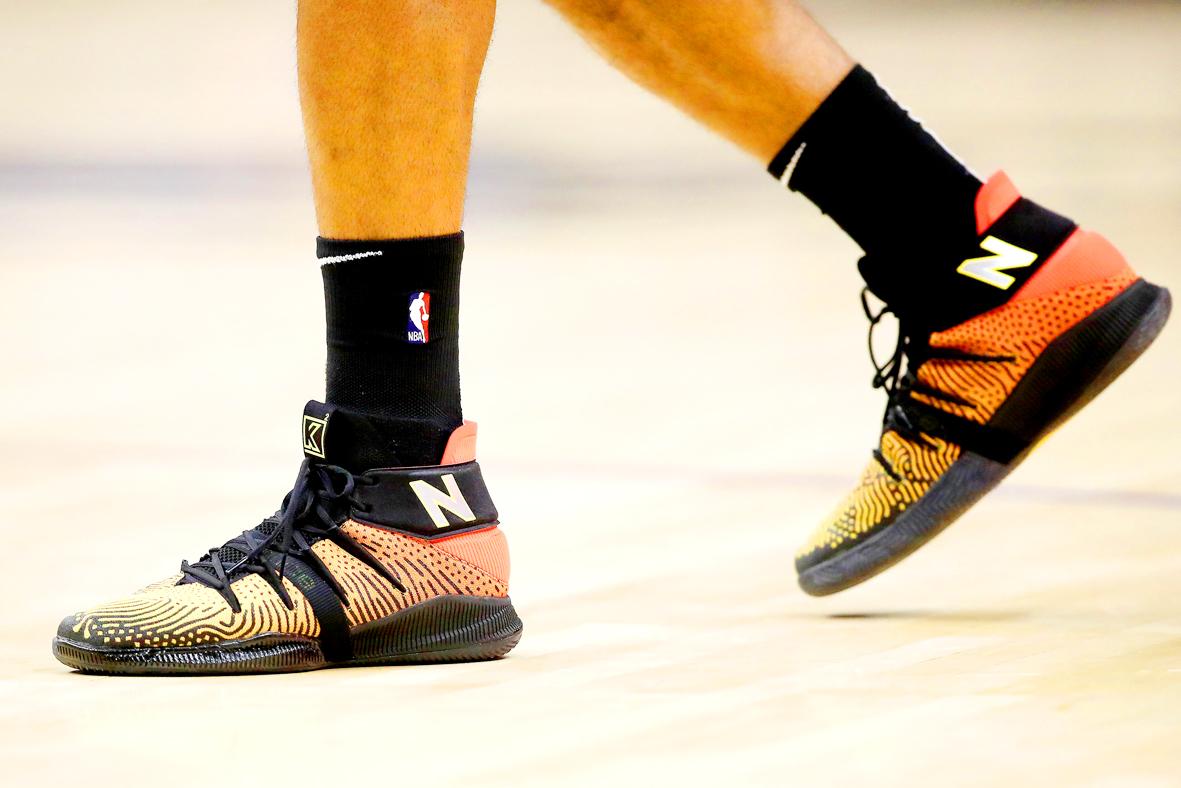Pou Chen Corp (寶成工業), the world’s largest maker of sports shoes, apparel and accessories, is mulling pay cuts and furloughs for its Taiwanese employees as orders slump amid the COVID-19 pandemic.
The Taichung-based company — whose clients include Nike Inc, Adidas AG, Puma AG, New Balance Athletic Shoe Inc and Timberland Co — is contemplating temporary pay cuts of 10 percent, furloughs and other cost-saving measures that would affect 3,000 employees in Taiwan and officials based in overseas factories.
Pou Chen spokesman Ho Ming-kun (何明坤) told reporters that the firm has not made a final decision, as it requires the consent of its workers’ union and the government.

Photo: AFP
The 51-year-old company is seeking to furlough employees for six days per month for three months, which might be extended depending on how the pandemic pans out, Ho said.
“It is better to be furloughed than laid off” in hard times, local Chinese-language media quoted Pou Chen employees as saying after a meeting with officials about the issue on Monday night.
Pou Chen’s first-quarter revenue tumbled 22.4 percent year-on-year to NT$59.46 billion (US$1.98 billion), the weakest in six years, company data showed.
Orders have reportedly plummeted 50 percent in the current quarter, with little visibility beyond, analysts said.
Nike, Adidas and other international sports brands have shut down retail outlets in the US, Europe and elsewhere to support social distancing orders by governments around the world to curb the spread of the virus, analysts said, adding that indefinite suspensions of major sports events have compounded the problem.
The company’s original equipment manufacturing (OEM) business for major footwear brands reported that sales declined by up to 16.4 percent year-on-year in the first two months of this year, Yuanta Securities Investment Consulting Co (元大投顧) said in a note earlier this month.
“Pou Chen’s OEM shoe sales volume was 322.4 million units in 2019, down 1.1 percent year-on-year,” Yuanta said. “Given that 60 percent of its OEM shoe business is from the EU and US markets, which will likely be impacted by COVID-19 in the first half of 2020, we estimate its OEM shoe business sales would fall by up to 10 percent year-on-year this year.”
The proposed 10 percent pay cuts would apply to employees and officials, including CEO Tsai Pei-chun (蔡佩君), daughter of the company’s founder, Tsai Chi-jui (蔡其瑞), media reports said.
It would be the first time Pou Chen had invoked such measures to stay afloat, and it said it hoped employees would understand and help the company survive the crisis. Pou Chen employs 350,000 workers at factories in China, Vietnam and Indonesia.
Operations in overseas markets are not covered by the belt-tightening scheme, local media said.
Shares of Pou Chen yesterday fell 5.54 percent to NT$27.30 in Taipei trading, underperforming the broader market’s 2.82 percent decline, Taiwan Stock Exchange data showed.
Earlier, the firm’s Vietnamese unit, Pouyuen Vietnam Co, suspended production for two days after failing to meet local rules on social distancing to curb the outbreak.

‘SWASTICAR’: Tesla CEO Elon Musk’s close association with Donald Trump has prompted opponents to brand him a ‘Nazi’ and resulted in a dramatic drop in sales Demonstrators descended on Tesla Inc dealerships across the US, and in Europe and Canada on Saturday to protest company chief Elon Musk, who has amassed extraordinary power as a top adviser to US President Donald Trump. Waving signs with messages such as “Musk is stealing our money” and “Reclaim our country,” the protests largely took place peacefully following fiery episodes of vandalism on Tesla vehicles, dealerships and other facilities in recent weeks that US officials have denounced as terrorism. Hundreds rallied on Saturday outside the Tesla dealership in Manhattan. Some blasted Musk, the world’s richest man, while others demanded the shuttering of his

ADVERSARIES: The new list includes 11 entities in China and one in Taiwan, which is a local branch of Chinese cloud computing firm Inspur Group The US added dozens of entities to a trade blacklist on Tuesday, the US Department of Commerce said, in part to disrupt Beijing’s artificial intelligence (AI) and advanced computing capabilities. The action affects 80 entities from countries including China, the United Arab Emirates and Iran, with the commerce department citing their “activities contrary to US national security and foreign policy.” Those added to the “entity list” are restricted from obtaining US items and technologies without government authorization. “We will not allow adversaries to exploit American technology to bolster their own militaries and threaten American lives,” US Secretary of Commerce Howard Lutnick said. The entities

Minister of Finance Chuang Tsui-yun (莊翠雲) yesterday told lawmakers that she “would not speculate,” but a “response plan” has been prepared in case Taiwan is targeted by US President Donald Trump’s reciprocal tariffs, which are to be announced on Wednesday next week. The Trump administration, including US Secretary of the Treasury Scott Bessent, has said that much of the proposed reciprocal tariffs would focus on the 15 countries that have the highest trade surpluses with the US. Bessent has referred to those countries as the “dirty 15,” but has not named them. Last year, Taiwan’s US$73.9 billion trade surplus with the US

Prices of gasoline and diesel products at domestic gas stations are to fall NT$0.2 and NT$0.1 per liter respectively this week, even though international crude oil prices rose last week, CPC Corp, Taiwan (台灣中油) and Formosa Petrochemical Corp (台塑石化) said yesterday. International crude oil prices continued rising last week, as the US Energy Information Administration reported a larger-than-expected drop in US commercial crude oil inventories, CPC said in a statement. Based on the company’s floating oil price formula, the cost of crude oil rose 2.38 percent last week from a week earlier, it said. News that US President Donald Trump plans a “secondary